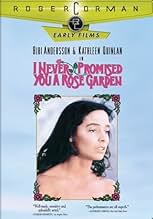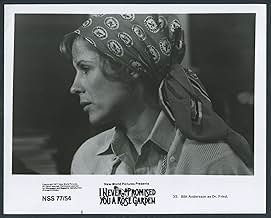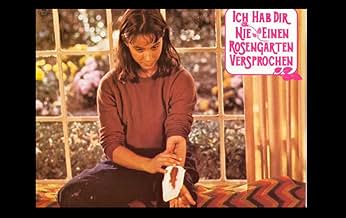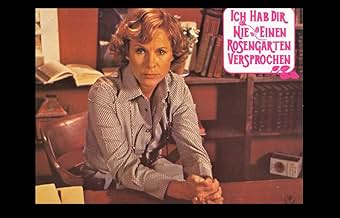Jamais je ne t'ai promis un jardin de roses
Titre original : I Never Promised You a Rose Garden
NOTE IMDb
6,4/10
1,7 k
MA NOTE
Ajouter une intrigue dans votre langueA disturbed, institutionalized 16-year-old girl struggles between fantasy and reality.A disturbed, institutionalized 16-year-old girl struggles between fantasy and reality.A disturbed, institutionalized 16-year-old girl struggles between fantasy and reality.
- Réalisation
- Scénario
- Casting principal
- Nommé pour 1 Oscar
- 4 nominations au total
Karin Collison
- Nurse
- (as Elizabeth Dartmoor)
Barbara Steele
- Idat
- (scènes coupées)
Avis à la une
If you've already read the book this film is a disappointment. If you haven't read it you are better off skipping the film and getting the book. The film removes too much of the book and basically makes little sense.
The film implies that Deborah's urethral cancer caused her schizophrenia. Which does a disservice to both the book and to the understanding of schizophrenia. Her other world is quite boring in the film and much richer in the book.
The cast is a good one which is why it warrants stars at all. And they do a good job at acting with what they had to work with.
The film implies that Deborah's urethral cancer caused her schizophrenia. Which does a disservice to both the book and to the understanding of schizophrenia. Her other world is quite boring in the film and much richer in the book.
The cast is a good one which is why it warrants stars at all. And they do a good job at acting with what they had to work with.
10Dara-3
Kathleen Quinlan plays Deborah, a very bright girl, who is institutionalized for three years in a psychiatric hospital. Though different from the book in some ways, this keeps the spirit of it quite well and with a much more satisfying ending than the book. Quinlan is a wonderful actress. Deborah, who is diagnosed as a schizophrenic (though she probably wouldn't be today), has a long, torturous journey through her illness. Quinlan makes us believe that she will succeed. In addition, there is a strong cast of mostly women of many ages. I saw this film first when I was a teenager and the problems Deborah faced also resonated with me (despite not being in a hospital). I have never forgotten this film, though it has been out of print on video for many years and can only view it when it occasionally makes it on television. Catch it if you can -- especially if you are a teenage girl or ever were.
Hannah Green's popular book has become first-rate medical drama despite echoes of other hospital horror shows (which are probably unavoidable) and many disturbing, alarming episodes which cause a general lack of relief to be intensely felt. Kathleen Quinlan is remarkable in a unheralded tour-de-force playing schizophrenic, suicidal young woman admitted into a mental institution by her parents. Quinlan's Deborah Blake is not an innocent lamb being tossed to the lions--she's as deeply troubled and psychotic as the other inmates--yet her doctor (a warm, compassionate Bibi Andersson) detects a core of sound reasoning to Deborah's manner, and works carefully on rescuing the girl from the demons who plague her. Deborah's fantasy world, which takes place in what appears to be a prehistoric civilization of Indian mystics, seems wildly overwrought at first (and we never do uncover the connection between Deborah and these tribal warriors and lovers); however the structure of the film is quite linear and, as we move from one chapter to the next, we can sense what drives this girl to self-destruction without a lot of technical jargon. Supporting cast is also strong, particularly Norman Alden as a kind orderly and Martine Bartlett (who played the mother in "Sybil") as a resident hysteric. Sylvia Sidney, as a returning patient who didn't make it on the outside, is typically a wonderful performer, yet she's never quite convincing in this part; her trained, poised style of acting tends to clash with the unbridled crazies who wander up and down the halls. Also, there's a small leap forward in time near the end which is momentarily confusing--perhaps another sequence with Andersson might have helped to prepare viewers for Blake's tentative recovery. Otherwise, a gut-wrenching achievement: unblinking, hard to watch on occasion, but undeniably potent and well-made. *** from ****
Deborah Blake (Kathleen Quinlan) is admitted to a country institution by her high street parents, unable to cope with the ignominy brought upon them, by her erratic, anti-social behaviour.
Taunted by her inner-demons (to which we're treated inventively from the mind's eye perspective), she's gradually cajoled from her psychosis by the unassuming, yet fiercely determined treating doctor - Bibi Andersson delivering a warm, sympathetic performance and headlining an impressive female cast that includes Signe Hasso, Susan Tyrrell, Diane Varsi, Silvia Sidney, screenwriter /actress Darlene Craviotto and taking a short break from her maternal duties on Martha's Vineyard, Lorraine Gary.
Along the journey, there's a couple of plot diversions, some poignant, others hackneyed and exploitative, but then would New World Pictures ever have distributed this movie without a stereotypical bully nurse scenario? Unlikely.
The Roger Corman production combines cinematic liberties with an at-times reverent translation of the Hannah Green novel, creating a compelling B-movie possessing an unusual dramatic-fantasy film tone. A cynical viewer might postulate that Corman saw a payday following the success of "One Flew Over the Cukoo's Nest", and to a large extent, this remains exploitative cinema. That said, Quinlan's performance clearly defies that brand, her characterisation personifies trauma and whilst often intense, isn't overcooked.
You have to commend New World Pictures for taking the plunge with this release against type, especially when you consider the other titles in their production line and catalogue at the time; 'Rose Garden' is a very different breed to your typical locally made New World Picture. Not perfect by any means and does have a tendency to stigmatise the subject matter, nevertheless an enjoyable film in spite of its flaws.
Taunted by her inner-demons (to which we're treated inventively from the mind's eye perspective), she's gradually cajoled from her psychosis by the unassuming, yet fiercely determined treating doctor - Bibi Andersson delivering a warm, sympathetic performance and headlining an impressive female cast that includes Signe Hasso, Susan Tyrrell, Diane Varsi, Silvia Sidney, screenwriter /actress Darlene Craviotto and taking a short break from her maternal duties on Martha's Vineyard, Lorraine Gary.
Along the journey, there's a couple of plot diversions, some poignant, others hackneyed and exploitative, but then would New World Pictures ever have distributed this movie without a stereotypical bully nurse scenario? Unlikely.
The Roger Corman production combines cinematic liberties with an at-times reverent translation of the Hannah Green novel, creating a compelling B-movie possessing an unusual dramatic-fantasy film tone. A cynical viewer might postulate that Corman saw a payday following the success of "One Flew Over the Cukoo's Nest", and to a large extent, this remains exploitative cinema. That said, Quinlan's performance clearly defies that brand, her characterisation personifies trauma and whilst often intense, isn't overcooked.
You have to commend New World Pictures for taking the plunge with this release against type, especially when you consider the other titles in their production line and catalogue at the time; 'Rose Garden' is a very different breed to your typical locally made New World Picture. Not perfect by any means and does have a tendency to stigmatise the subject matter, nevertheless an enjoyable film in spite of its flaws.
Not a movie to catch if you're feeling down. Those scenes in the dayroom where the afflicted patients mingle are almost scary. Each woman acts out her own version of mental derangement, from hollering, to yelling in-your-face, to grabbing and shoving. Looks to me like the Pittsburgh Steelers are needed to keep order. In fact, I can't understand why therapeutic science would allow such intermingling among the psychologically afflicted. Just what the therapeutic effects might be is beyond me. Actually the tormented images brought back similar ones from the 1948 flick, The Snake Pit, that scared the heck out of me as a kid, except this 1977 epic should maybe be called The Demon Pit. I guess this movie's ironic title was so as not to scare off prospective viewers.
Actually what holds the movie together are outstanding performances by the two leading actresses, Quinlan and Andersson. I don't think I've seen a more emotionally affecting turn than Quinlan's, as her teenage Deborah poignantly struggles with inner demons she imagines as some kind of tyrannical barbarians. Aside from that inner struggle, we unfortunately know little about her or why she has lost her grip. Or for that matter do we know much about any of the many characters roaming the halls. Coming to Debbie's aid is psychiatrist Dr. Fried portrayed winningly by Swedish actress Andersson. She's low-key in her methods and between the two there's a growing magnetism that brings us back from the scenes of torment. To me, Quinlan at least deserved an Oscar nomination as I don't think I've been so moved in 70 years of movie watching as by her huggable presence. Also, it's good to see vintage actress Sylvia Sydney picking up a payday. Forty years earlier and that fine soulful actress could have succeeded as the poignant young Deborah.
(In Passing: Though it passes by quickly, note Deborah's unconventionally hairy armpit, showing her rejection of a significant gender norm. It also shows production's careful attention to minor detail.)
All in all, the movie's too exotic for me to rate on the usual scale. But, despite the histrionics and foggy chairacter backgrounds, you may want to catch its engagingly sensitive core.
Actually what holds the movie together are outstanding performances by the two leading actresses, Quinlan and Andersson. I don't think I've seen a more emotionally affecting turn than Quinlan's, as her teenage Deborah poignantly struggles with inner demons she imagines as some kind of tyrannical barbarians. Aside from that inner struggle, we unfortunately know little about her or why she has lost her grip. Or for that matter do we know much about any of the many characters roaming the halls. Coming to Debbie's aid is psychiatrist Dr. Fried portrayed winningly by Swedish actress Andersson. She's low-key in her methods and between the two there's a growing magnetism that brings us back from the scenes of torment. To me, Quinlan at least deserved an Oscar nomination as I don't think I've been so moved in 70 years of movie watching as by her huggable presence. Also, it's good to see vintage actress Sylvia Sydney picking up a payday. Forty years earlier and that fine soulful actress could have succeeded as the poignant young Deborah.
(In Passing: Though it passes by quickly, note Deborah's unconventionally hairy armpit, showing her rejection of a significant gender norm. It also shows production's careful attention to minor detail.)
All in all, the movie's too exotic for me to rate on the usual scale. But, despite the histrionics and foggy chairacter backgrounds, you may want to catch its engagingly sensitive core.
Le saviez-vous
- AnecdotesThe lead female role of of Deborah Blake in this picture was previously intended for Natalie Wood who had unrealized plans to both produce and star in the movie. Wood once had planned to produce the picture as well as star in it in the role of Deborah Blake but those plans never materialized. The part in the end was played in the film by Kathleen Quinlan.
- GaffesIn the New Year's Eve party scene, Deborah is seen with loose hair talking to Dr. Fried and then there is a close-up of Deborah with her hair pulled back from her forehead.
- Citations
Deborah Blake: You can turn me off, you know. You can go off with your friends and write another paper on schizophrenia and get an award for it. But I can't turn me off. So I'm calling off the fight.
Dr. Fried: So you quit. Stay in the nuthouse for the rest of your life.
Meilleurs choix
Connectez-vous pour évaluer et suivre la liste de favoris afin de recevoir des recommandations personnalisées
- How long is I Never Promised You a Rose Garden?Alimenté par Alexa
Détails
- Date de sortie
- Pays d’origine
- Site officiel
- Langue
- Aussi connu sous le nom de
- I Never Promised You a Rose Garden
- Sociétés de production
- Voir plus de crédits d'entreprise sur IMDbPro
Contribuer à cette page
Suggérer une modification ou ajouter du contenu manquant






















